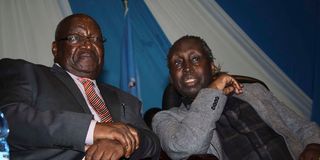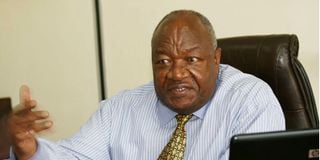Ngũgĩ wa Thiong’o: Henry Chakava - My friend, student and saviour

Prof Ngũgĩ Wa Thiong’o (right) with East African Educational Publishers’s Henry Chakava during a lecture at the University of Nairobi’s Taifa Hall in June 2015.
What you need to know:
- Chakava helped Ngũgĩ cater to his family’s needs during his forced exile in London by paying him royalties.
- Chakava died at 5am Friday, March 8, at a hospital in Nairobi.
He was my student, one of the first graduates of the new Department of Literature at the University of Nairobi, which had replaced the old English Department.
The old English Department was Anglo-centric and placed Europe at the centre of our sense of being, meant to produce servile minds. The new department was Afro-centric and centred Africa in our sense of being. Sure of their roots in Kenya and Africa, the graduates would face and interact with the globe with pride without arrogance.
And then he became my publisher and he remained so to his passing on to take his place among the great pioneers of African pride, like Kwame Nkrumah, Julius Nyerere, Amilcar Cabral and Abdul Nasser.
He had just graduated when he joined the British-owned Kenya branch of the Heinemann Publishers, famous for their African Writers Series that gave the world writers of the Chinua Achebe generation.
He would soon become its young first African General Manager. And then he did something which should have shown Kenya and Africa the way. He turned the British-owned company into a Kenyan-owned and run enterprise with a new name: East African Educational Publishers, soon to become the leading African-owned and run publishing company in Africa and the world. Today the parent London-based Heinemann Publishers is dead.
Also Read: Veteran publisher Henry Chakava dies at 77
And when his time came, he released the leadership of the company to its current leader, Kĩarie Kamau. So, the East African Educational Publishers is still marching on along the visionary road Henry Miyinzi Chakava set it.
More than its mere survival, it was also the direction that Chakava gave it, which is important. He continued publishing in English. In Kenya, English is still the language of power in government, education and commerce. But under him, the company did for Kiswahili more than any other publishing house then and now. In addition to new school texts in Kiswahili, he published the Kiswahili translations of nearly all the books in the Heinemann African Writers Series. But he also published new texts in other African languages.
He almost lost his life for doing so. In 1977, Jomo Kenyatta hauled me into Kamĩtĩ Maximum Security Prison for helping in the writing and the performance of the Gĩkũyũ language play Ngaahika Ndeenda/I will Marry when I Want.
In Prison I wrote my first novel in Gĩkũyũ, Caitaani Mũtharabainĩ/Devil on the Cross. I wrote it on toilet paper. I was released in December 1978 under the new government of Daniel arap Moi, the man who as Minister for Home Affairs had signed my detention papers.
News of the forthcoming publication of the first-ever Gĩkũyũ language novel must have reached the ears of the government. Chakava began getting anonymous telephone calls threatening his life, should he go ahead with the publication. A week or so before the publication, some assassins tried to abduct him outside the gates of his residence.
A passing vehicle saved him. But not before losing his finger to a panga cut. Guess what, Chakava went ahead and released the novel, and thus made possible the beginnings of modern Gĩkũyũ language literature.

The late veteran publisher Henry Chakava during a past interview. He died on March 8, 2024.
He saved my writing career. And then he saved my life. In 1982, I had gone to London for the launch of Devil on the Cross, the English translation of Caitaani Mũtharabainĩ. I was due to return to Kenya when I got information that a “red carpet” awaited me at Jomo Kenyatta International Airport. Red signified blood. It was June 1982. I cancelled my flight back to Kenya. And thus began my life in exile.
I had no job in London and I had a family in Kenya to feed. Chakava saved the situation: he continued paying me royalties. Years later, I would learn that it was some intelligence from a foreign embassy in Nairobi who had passed on the threats to my life to Chakava. He passed the information to the late Ngũgĩ wa Mĩriĩ who passed on the news to me.
You would think that after this Chakava would want to avoid me like the plague. But no. Not Chakava. In 2004, I returned to Kenya after nearly 23 years of forced exile, for the launch of my second Gĩkũyũ language novel: Mũrogi wa Kagogo/Wizard of the Crow. The publishers had put me up in the very safe Norfolk Apartments, quite close to the Central Police Station.
Eleven days after, four armed assassins broke into my room. My wife and I barely escaped with our lives. We found refuge in Chakava’s house. Every evening for the duration of our stay in their house, a police vehicle, flashing red lights, would drive around his house. I would have understood if the Chakavas had asked us to leave. But they didn’t.
Also Read: Henry Chakava - Father of Kenya’s book publishing industry who dared where no one else would go
Later, whenever I visited Kenya, I would feel safe only in Chakava’s. He and his wife, Rosalind, became my guardian angels. Rosalind embraced me fully with sumptuous meals that always begun with prayers. Food for the body. Food for the Soul. That was Rosalind. And Chakava spiced the meals with intellectual diet.
He and I suffered from kidney failure. And both of us, publisher and writer, would sometimes be on wheelchairs. We often exchanged information about our dialysis experience and about good diet for kidneys.
We had a meeting of minds, and in 2017 and 2018 he sponsored my nationwide tour to promote books in indigenous languages spoken in Kenya. I can recall going to Kilifi to promote Kigiryama, to Kisii to promote Ekegusii, Maseno to promote Dholuo and Kitui to promote Kikamba, among other regions. Apart from these books which he published at EAEP, he had started a Chakava imprint for books in Lologooli, his mother tongue, thus joining the company of Bosibori Obuchi, who has already published many books in Ekegusii, and the Senegalese Boris Bubacar Diop who publishes books in Wolof. Chakava sent me a copy of Limenya liu Mulogooli.
This giant of man walked among us but always with humility, never conscious of his size. I hope the government and universities in Kenya will accord him the national honour he deserves. Whatever the case, he will always live in the hearts of millions in Kenya, Africa and the world.
But for me, he will always remain my friend, my student, my publisher, my saviour.




